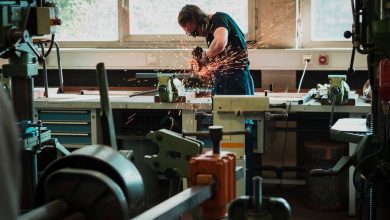An In-depth Look at Laser Levels

Laser levels have become an indispensable tool for professionals and DIY enthusiasts alike. With their precise measurements and ease of use, they have revolutionized the way we approach construction and home improvement projects. In this article, we will take an in-depth look at laser levels, exploring their features, applications, and benefits.
Understanding Laser Levels
At its core, a laser level is a device that emits a laser beam to create a straight, horizontal or vertical line. This line serves as a reference point for various construction tasks, such as aligning walls, installing fixtures, and hanging pictures. Laser levels can be classified into two main types: rotary and line laser levels.
Rotary Laser Levels
Rotary laser levels project a 360-degree laser beam in a horizontal plane. They are primarily used for large-scale construction projects, such as laying foundations or installing ceilings. Rotary laser levels are equipped with a rotating head that creates a continuous line, allowing for precise leveling over long distances.
Line Laser Levels
Line laser levels, on the other hand, emit a laser beam in one or multiple directions to create a straight line. They are commonly used for interior projects, such as tiling, cabinetry, and electrical installations. Line laser levels are lightweight, portable, and easy to operate, making them a popular choice among DIY enthusiasts.
Key Features and Functions
Laser levels come with a range of features and functions that enhance their usability and accuracy. Here are some key features to look out for:
1. Self-Leveling: Most laser levels are equipped with a self-leveling mechanism that automatically adjusts the laser beam to maintain a level line. This feature ensures accuracy and saves time by eliminating the need for manual adjustments.
2. Multiple Beam Options: Some laser levels offer the option to project multiple beams, allowing for more complex layouts and measurements. This feature is particularly useful in applications that require perpendicular or angled lines.
3. Visibility Range: The visibility range of a laser level determines how far the laser beam can be seen. It is important to consider the working environment and choose a laser level with a suitable visibility range.
4. Mounting Options: Laser levels can be mounted on various surfaces, such as tripods, poles, or magnetic brackets. The type of mounting option will depend on the specific project requirements.
Applications and Benefits
The versatility of laser levels makes them useful in a wide range of applications. Some common applications include:
1. Construction: Laser levels are essential for tasks such as laying foundations, aligning walls, and installing ceilings. They provide precise measurements and ensure accurate alignment, resulting in better overall construction quality.
2. Interior Design: Laser levels are invaluable for interior design projects that require straight lines and leveled surfaces. They can be used for tasks such as tiling, hanging wallpaper, and installing cabinetry.
3. Landscaping: Laser levels can also be used in landscaping projects, such as leveling ground, aligning fences, and installing irrigation systems. They simplify the process and help achieve a professional-looking result.
The benefits of using laser levels are numerous:
1. Time-Saving: Laser levels eliminate the need for manual measurements and adjustments, saving valuable time on construction and renovation projects.
2. Accuracy: Laser levels provide precise measurements and ensure straight lines, resulting in better quality workmanship.
3. Ease of Use: Laser levels are designed to be user-friendly, with intuitive controls and clear visibility of the laser beam. This makes them accessible to both professionals and DIY enthusiasts.
In conclusion, laser levels have revolutionized the way we approach construction and home improvement projects. With their precise measurements, ease of use, and versatile applications, they have become an indispensable tool in the toolbox of both professionals and DIY enthusiasts. Whether you are building a new structure, renovating your home, or working on a landscaping project, a laser level will undoubtedly enhance your productivity and ensure accurate results.




